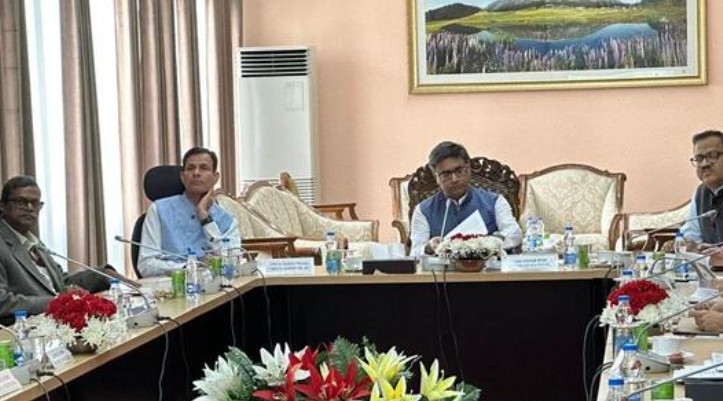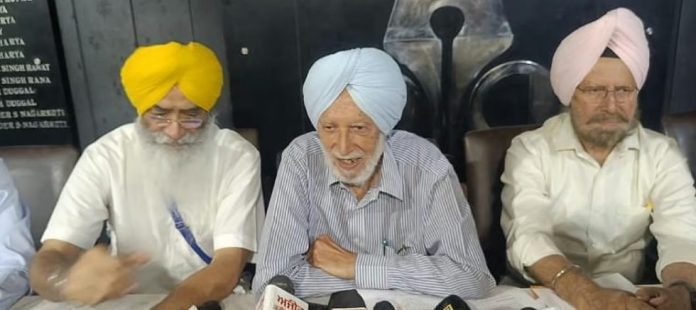The Indus Water Treaty, signed in 1960 between India and Pakistan, has once again become a focal point of debate, especially in Punjab, where voices are growing louder against the perceived injustices of the agreement. Recently, a former senior bureaucrat expressed deep concern over the treaty, calling it a “historic blunder” that has deprived Punjab of its rightful share of river waters. He passionately argued that it is time for India, particularly Punjab, to reassert its rights over these vital natural resources and demand the return of its waters.
The Indus Water Treaty, brokered by the World Bank, divided the rivers between India and Pakistan. The eastern rivers — Ravi, Beas, and Sutlej — were allocated to India, while the western rivers — Indus, Jhelum, and Chenab — were given to Pakistan. Although the arrangement was meant to be equitable on paper, in reality, the bureaucrat noted, it failed to take into account the interests of Punjab, the land where these rivers actually flow. The loss of water over the decades has crippled agriculture, industry, and the overall ecological balance in Punjab, leading to serious economic and environmental consequences.
He emphasized that Punjab has historically been known as the breadbasket of India, owing largely to its rich network of rivers and canals. The state’s agricultural prosperity was directly linked to the ample supply of water. However, after the treaty was enforced, the availability of river water diminished significantly, forcing Punjab to become heavily reliant on groundwater resources. This over-extraction of groundwater has led to alarming depletion levels, endangering both present and future generations. He warned that the situation is now reaching a crisis point, with vast tracts of fertile land facing the threat of desertification if immediate action is not taken.

The former bureaucrat highlighted that while Pakistan continues to benefit enormously from the water flowing through the western rivers, Punjab — ironically the very region where the rivers originate — suffers from scarcity. He criticized successive Indian governments for failing to renegotiate or amend the terms of the treaty, despite drastic changes in geopolitical, environmental, and technological realities over the past six decades. In his view, the agreement should never have been signed without the full consent and participation of the affected states, especially Punjab. Instead, decisions were made at the national level, sidelining the people most impacted by them.
He drew attention to various instances where Punjab’s legitimate claims over water were ignored or sacrificed for political expediency. The ongoing disputes over the Sutlej-Yamuna Link (SYL) canal and the sharing of Ravi and Beas waters are prime examples of the injustices he cited. Instead of ensuring Punjab’s interests, policies have repeatedly led to its waters being diverted to other states, exacerbating the water crisis within Punjab itself. This systematic denial of rightful resources has not only harmed Punjab’s economy but has also caused deep resentment and feelings of betrayal among its people.
Calling the Indus Water Treaty a “historic blunder” was not mere rhetoric, he insisted. It was a reflection of decades of accumulated grievances and the urgent need for a thorough re-examination of the arrangement. He proposed that the Government of India initiate diplomatic and legal efforts to revise the treaty in a manner that safeguards the interests of Punjab. Furthermore, he urged the Punjab state government to be more proactive and assertive in advocating for the state’s water rights at both national and international forums.
The bureaucrat also pointed out that global environmental norms and practices have evolved considerably since 1960. Issues such as climate change, sustainable development, and equitable resource sharing are now central to international discourse. In this context, the continuation of an outdated and inequitable treaty appears not only unjust but also environmentally unsustainable. He stressed that India must leverage these global concerns to build a strong case for renegotiating the treaty.
Moreover, he appealed to Punjab’s youth, farmers, academicians, and civil society to become more vocal and organized in their demand for the return of river waters. He said that movements grounded in public awareness, legal activism, and political lobbying would be crucial to bringing about meaningful change. According to him, this was not just a matter of economic survival but a fight for the very soul and future of Punjab.
In his address, he painted a vivid picture of the consequences of water scarcity. He spoke about farmers who are forced to dig ever-deeper tube wells, incurring enormous costs and endangering groundwater reserves. He mentioned towns and villages where the water table has fallen to critical levels, leading to poor crop yields and worsening poverty. He linked the water crisis directly to rising rural indebtedness, farmer suicides, and the general deterioration of the agrarian economy.
In addition to economic damages, he also discussed the ecological toll. The loss of wetlands, degradation of riverine ecosystems, declining biodiversity, and increasing soil salinity were among the devastating environmental impacts he outlined. He stressed that restoring Punjab’s rivers was essential not only for human prosperity but also for protecting its natural heritage.
While recognizing the complexity of international treaties and the challenges involved in revisiting them, he remained optimistic that concerted efforts could yield results. Citing examples from around the world where outdated water treaties were renegotiated or adapted to contemporary realities, he insisted that India must not shy away from difficult but necessary diplomatic engagements.
He also took aim at the often-cited argument that revisiting the Indus Water Treaty could strain Indo-Pak relations. He argued that national interest and the welfare of Punjab’s citizens must be the top priorities, and that negotiations could be conducted respectfully but firmly. Ensuring water security, he said, is as much a matter of national security as any other strategic concern.
In concluding his remarks, the former bureaucrat issued a clarion call to Punjab’s leadership — across political, social, and academic spheres — to unite and champion the cause of reclaiming the state’s rightful share of river waters. He urged them to set aside partisan differences and work collaboratively for a future where Punjab’s rivers once again flow freely through its fields, sustaining its people and preserving its legacy as the land of five rivers.
His powerful speech served as a reminder that water, often taken for granted, is the lifeblood of civilizations. It was a call to action to recognize past mistakes, correct historical wrongs, and secure a sustainable and prosperous future for Punjab. In his vision, restoring Punjab’s river waters was not just about hydrology or politics — it was about justice, identity, and survival.


